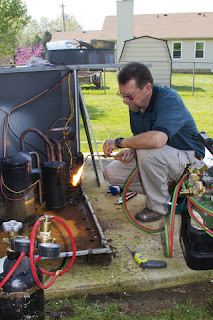Central air conditioner units can work without problems for years if serviced and maintained properly. In case they don’t work properly, call up a skilled technician. However, before making the call, make sure the problem is not just a minor glitch that you can fix on your own.
The unit stops to work:
If you get your system cleaned and inspected annually, it must run with no trouble. However, if the air conditioning system stops working and you are not sure why, troubleshoot the problem before calling a professional:
The unit stops to work:
If you get your system cleaned and inspected annually, it must run with no trouble. However, if the air conditioning system stops working and you are not sure why, troubleshoot the problem before calling a professional:
- Check the fuse box or circuit breaker to find out if the system has power.
- Check the fuses near the condenser, to ensure there’s power.
- Clean or replace the furnace filter.
- In case the condenser coils are covered with debris or dust, clean them off with a garden hose.
The unit won’t stop running:
If the system won’t quit running then here’s what you should do:
If the system won’t quit running then here’s what you should do:
- Turn the thermostat up.
- By setting the thermostat a little higher, you will save a lot of money on energy bills.
- Take the lid of the condenser off and check if something is blocking the flow of air.
- Vacuum the condenser’s interior, and then clean it with a garden hose.
- In case the fan blades are dirty or bent, clean them or get them straightened.
- Check the blower and furnace filter to see if there is any blockage. Make use of a vacuum cleaner to clean the dirt and dust around or on the blower.
- Get the filter replaced if required.
The system freezes:
In case the high pressure lines from the evaporator coil or furnace to the condenser are iced up, then make sure you shut the unit down:
In case the high pressure lines from the evaporator coil or furnace to the condenser are iced up, then make sure you shut the unit down:
- Either pull the switch outside or turn off the breaker within the control panel.
- Call a professional for help.
- Water begins to pool below the evaporator
In case there is water under the evaporator, the drain may get clogged. Although it can be cleared, the best thing to do is to replace it.
- Take the trap off, and in case it’s plastic, cut the pipe and do away with it.
- Pour bleach-water or a vinegar-water inside the drain. This should help in removing algae and debris.
- In case you have flexible tubes, clean them. You can also use a wire to scrape the tube walls. Make sure you perform this maneuver gently.
- Reassemble the trap and tubes.
Although its isn’t rocket science to troubleshoot a central air conditioner, if you find the whole procedure tiring and cumbersome it is best to hire an expert to do the job for you.








